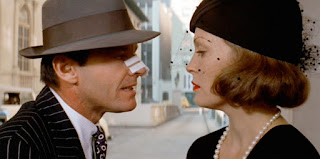Cleveland the Script: Chinatown Meets Body Heat
 "(Film Noir is) a movie which at no time misleads you into thinking there is going to be a happy ending." - Roger Ebert
"(Film Noir is) a movie which at no time misleads you into thinking there is going to be a happy ending." - Roger Ebert
It all started with the alleys of Cleveland. Living in downtown Cleveland, back when it was the uncool thing to do, to bypass traffic patterns, you often took shortcuts. Alleys are the very best shortcuts and so much of noir is anchored in alleys and shadows because the characters in film noir at a critical and often desperate time of their lives took a shortcut. And they've been paying for it ever since.
Urban alleys, especially of those Midwest metropolises that cultivated during the industrial revolution, are dark and narrow and creepy. They typically house garbage dumpsters, building back doors and shady parking spots for even shadier cars. Sometimes there's rats, often used as cinema symbolism to signify a betrayer. The combination of alleys (short cuts) and rats (betrayers) and absence of light (darkness) creates an atmosphere of claustrophobia. I don't know anyone who wanted to linger in an alley. And given the narrowness of the space sandwiched between tall buildings with no pretense of back facades (only front), alleys also amplify the sounds between. Literally and metaphorically, alleys are a city's echo chamber.
When I lived in Downtown Cleveland I couldn't get enough of those alleys. I walked them, photographed them, wrote about them, talked about them. I wondered where they led. What they revealed. What they tried to hide. I paid attention to the ground - cobblestone or paved or paved over cobblestone with the newer material so decayed the old one showed through. I looked left and right, at the buildings that converged, all built with attached walls, trading secrets that humans will never know. I looked up, at the sky, to see how far up the bricks went. Most Downtown Cleveland buildings are mid-rise, averaging just above ten floors. At least the century old ones were. The new ones being constructed are taller, built of glass and light and transparency, hiding nothing. Offering no mystery.
The Cleveland pavement and one critical night in the city, exactly ten summers ago, inspired this story. It hasn't let me sleep. And even though I've released several books and photography exhibits since this relentless muse first decided to jump my soul and establish unapologetic residency, this story won't let me rest. It's demanding to be written. And seen.
In the past year or so it's gotten tighter and tighter and working with Jacob Livshultz, the tightness of the truth finally came to surface. The genre is, of course, film noir. And the greatest screenplay ever written just happens to be Chinatown, produced by the Robert Evans (Godfather, Godfather 2, Jade). If you're a film lover, you've seen it and know well the iconic scene at the end. Everything in that story is about water, and how certain speculators began to steal the water from farmers and into L.A., to build that metropolis. No detail is left unsaid or undone. Even the antagonist's name is Noah Cross. But, really, the film's theme is much darker. What these speculators did to L.A. is horrifying and that theme is reconstructed within shocking family dynamics.
For everything Chinatown is - and it is perfect -Cleveland takes inspiration not just from this classic, but also from Body Heat, starring Kathleen Turner and William Hurt. For that story is taking noir to a hot, Florida location and turning up the heat on two people who have no business being together. That is what noir does, it attracts the low brow and the high brow, the criminal and the millionaire, the young and the old, the ambitious and the jaded and throws them all together into a tight, dark space that amplifies all their dreams and nightmares. Often these contrasts are one and the same. And the erotica in Body Heat turns these perversions up a notch.
"What happens when a guy who has personal charm and has done well with women but isn't effective in the world runs into someone who's effective in the world?" - Lawrence Kasdan
Cleveland also has some Mildred Pierce thrown in. My own life story took a turn when I became a mother and as result so did this script. Everything finally made sense. And the maternal figure in the background of Cleveland suddenly came front and center. She has some things in common with Mildred. Was Ms. Pierce a proto-feminist? Was she rewarded or punished for leading the life of a single, working mother? That film begged these questions back in 1941. Nearly eight decades later, society is still defending and attacking the duality.
"(In noir) motherhood is never entirely natural, and female ambition - like all ambition in noir - comes at a heavy price." - Megan Abbott
images: IMDb.com
Kasdan, Abbott quotes: Time Life, Film Noir, 2016




Comments
Post a Comment